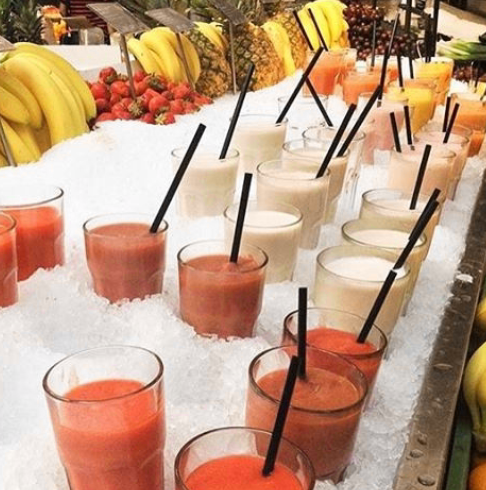
There’s no doubt water is the best thirst quencher, but sometimes we want to indulge in something a little more fun, especially in summer! Unfortunately some of these refreshing drinks are packed full of sugar and on those hot summer days, they go down just a little too easily.
Let’s take a look at some of our favourite thirst quenchers. It is important to note that the products are compared per 100ml however standard servings are usually 2 and a half times this amount!
First up is the crowd pleasing ice tea. 100ml contains 93kJ and 5.3g sugar. It is important to remember a usual serving size is 250ml and kilojoules can add up quickly with a few glasses. There are ‘lite’ varieties available which contain less sugar.
Another favourite are soft drinks. Original varieties contain around 180-220kJ per 100ml and 10-12g sugar. Similar to ice tea, people would normally consumer more than double this amount in one glass with many glasses holding up to 600ml – so six times this amount!. More diet options are becoming available so be sure to read the nutrient information panel to compare energy and sugar contents. Remember that too much artificial sweetener can give you tummy upsets though.
Soda water flavoured withand cordial is another popular cooler during the summer months and a good alternative to water or soft drinks. Thise beverage contains approximately 64kJ and 3.5g sugar per 100ml, so they are a refreshingsensible alternative to plain soda water.
Interestingly, slushie drinks, (for example 7/11’s Slurpee), can contain as little as 0.2g sugar and only 70kJ per 100g, but contain lots of artificial colours.
When looking for something a little more filling and nutrient dense to drink, smoothies such as Boost Juice are a popular choice. 100ml of a standard low fat smoothie can contain around 280kJ per /100ml, 2g protein and approximately 12g sugar (although many of these sugars will be natural dairy and/or fruit sugars) and 2g protein. You can also choose to add an extra protein boost which will give an additional 20-25g protein (per original size), but remember that this also adds more kilojoules. Where possible, try making your own smoothie using your favourite fruits and vegetables, remembering that keeping the skin on means more fibre.
Another more nutrient dense alternative is iced chocolate. These are often made with whole milk and ice-cream, with 100ml containing around 838kJ, 12g fat (7.5 saturated fat) and 20g carbohydrates (18.5g being sugar and natural milk sugars).
Milk gives them a more wholesome profile by providing protein, vitamins and minerals. Always remember you can choose low fat milk and omit the ice cream to cut down the kilojoule content.
Freshly squeezed juice is another populargreat choice, but remember to keep portion sizes small as there is a lot more than one orange in a glass of orange juice!.
My favourite?
My favourite summer drink is sparkling mineral water flavoured with slices of fresh fruit. It contains no kilojoules, no fat and no sugar and always feels like a special treat.
